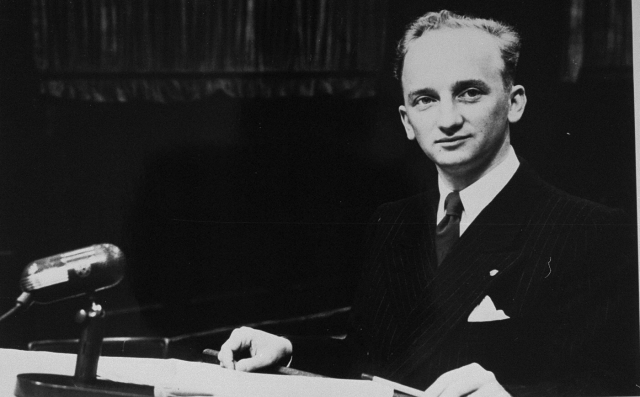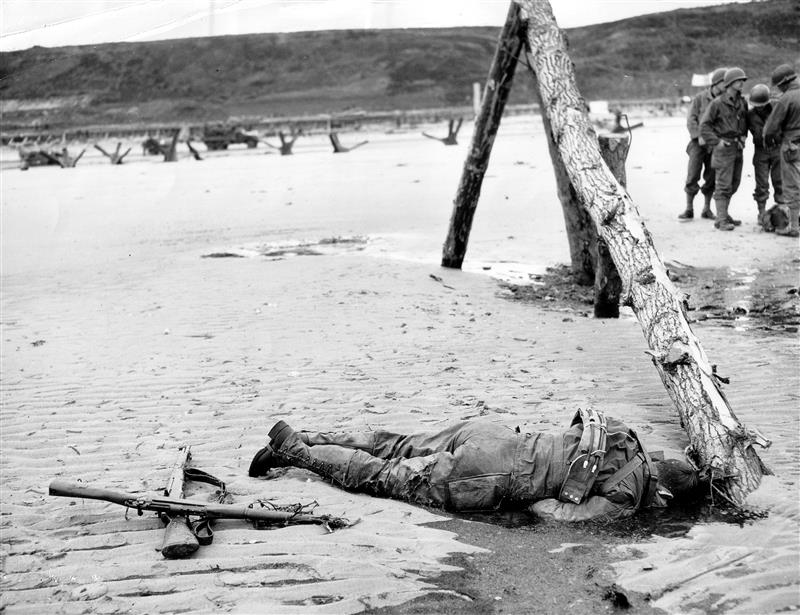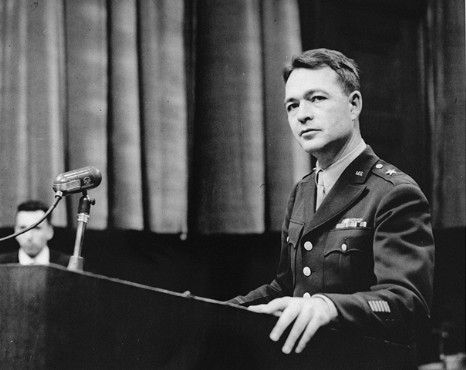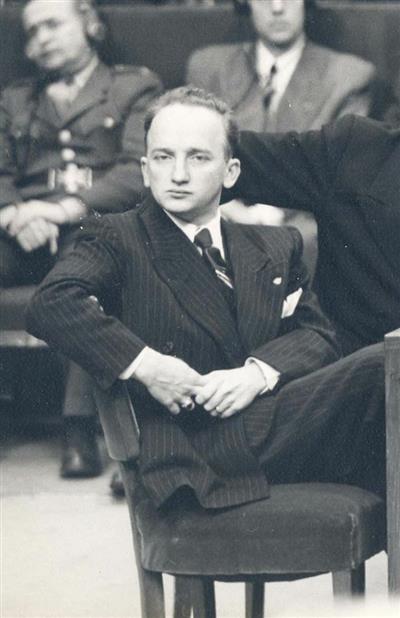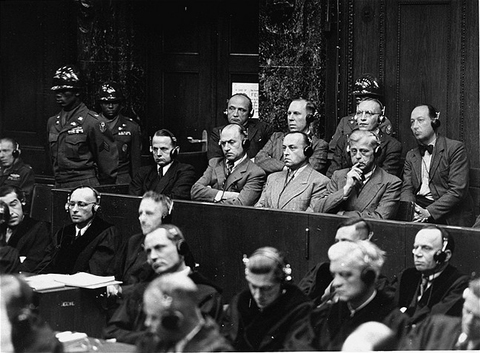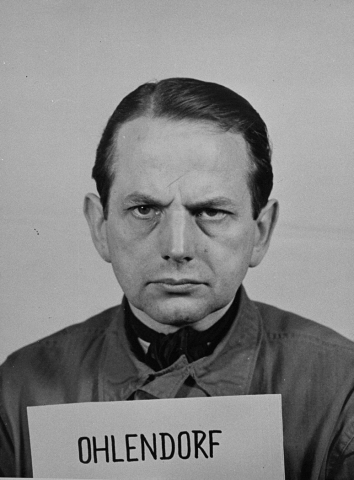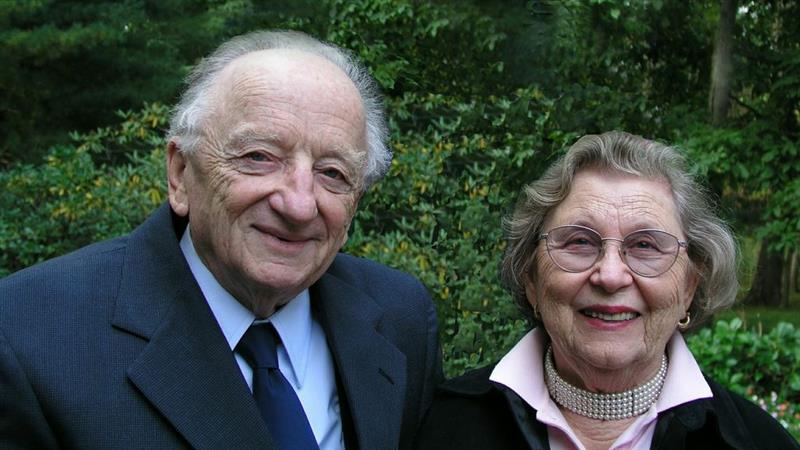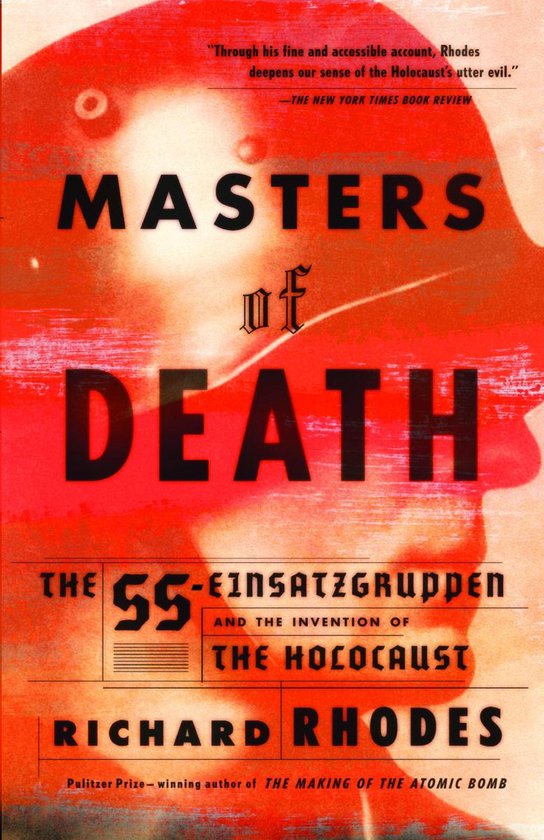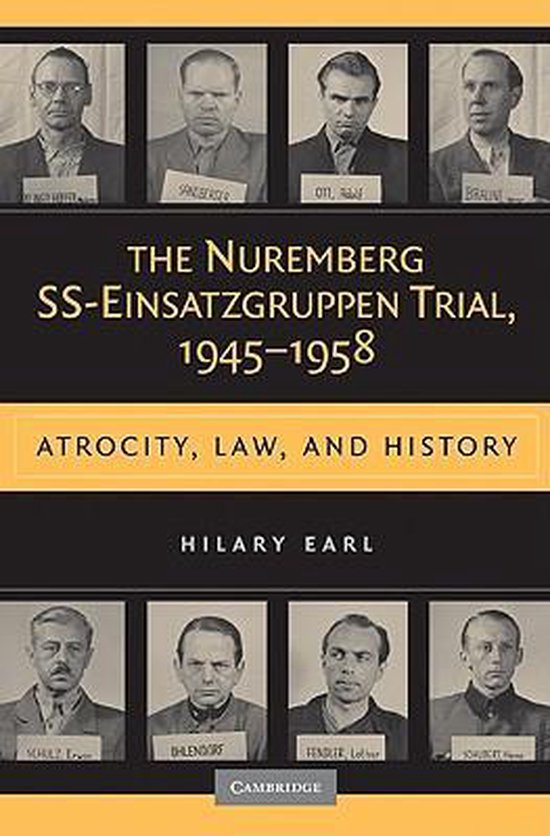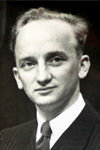His struggle for justice
Benjamin Ferencz (1920) was just 27 years of age when he was appointed chief prosecutor shortly after the war at the Einsatzgruppen tribunal in Nuremberg that was called the 'largest murder trial in history' by the media. Twenty-four former leaders of the German death squads were indicted to account for the murder of over 1 million Jews and other ethnic groups on the Eastern Front. The young Jewish-American lawyer owed his appointment to his drive because he couldn't rely on a glorious military or judicial career.
American dream
Benjamin Berell Ferencz's life story is a prime example of the American dream. In 1921, at the age of 10 months he, his parents and elder sister emigrated to the United States. He was born in a poor farmer's house in Transylvania. The Jewish family was driven to America because of anti-Semitism. Initially, Benjamin's father was a shoemaker but in New York he found employment as a janitor in the suburb of Hell's Kitchen on Lower East Side in Manhattan. It was for from being an inspirational neighborhood for a child to grow up in: the suburb had the highest criminality rate of the country and the impact of the Wall Street Crash of 1929 was immense for the not exactly prosperous inhabitants. Poverty and unemployment made many of them dependent on government support, Benjamin's father included
When Benjamin was six years old, his parents separated but the divorce and the poor situation he grew up in, didn't hurt him. He grabbed every opportunity to make something out of his life. As a teenager he made some money with all kinds of odd jobs. He took secondary education at Townsend Harris High School, a public school and after graduation, he was automatically admitted to City College of New York. As study at this school was free of charge, the institution was known as 'Harvard for the poor'. Ferencz studied here from 1937 to 1940 and would remain thankful to the United States for the free education he had enjoyed. Never before had a member of his family gotten the chance to study.
From early age, Benjamin knew he wanted to become a lawyer. Based on his experiences in Hell's Kitchen he wanted to make a contribution to fighting juvenile crime. He gained his first experience in the judicial world by doing volunteer's work in the penal code system of New York during his study. There he discovered that seemingly respectable citizens were able to commit the most atrocious of crimes, a conclusion he would see confirmed later in Nuremberg. In 1940, at the age of 20 he made his bachelor degree in social sciences. Thereafter he set his mind to continuing his study at Harvard Law School. He was accepted by this prestigious university, a great achievement for the young boy who seemed to be destined for a life in poverty during his early years.
From Harvard to Omaha Beach
At Harvard, Ferencz developed a great sense of ethics and human rights. As assistant to Professor Sheldon Glueck, he gathered information for a book by the criminologist about German war crimes. During his study at law, the Second World War raged in all its ferocity. After the Japanese attack on Pearl Harbor, the young student had reported for military service but without him knowing it, the official of the local registration office took steps to allow him to finish his study. After graduation in 1943, Ferencz was posted to the 115th Anti-Aircraft Artillery (AAA) Gun Battalion. Because of his linguistic skills, he had preferred to serve in the intelligence branch but that was impossible because he wasn't an official U.S. citizen long enough. To his disappointment, his small posture also excluded him from the paratroops and the air force.
From March to September 1943, Ferencz underwent basic military training at Camp Davis, North Carolina. It was an enormous switch from the freethinking academic world to the rigid military existence. Ferencz assumed the hour long marches were only meant to teach the soldiers to 'distinguish the right foot from the left.' The headstrong recruit frequently clashed with his superiors. ' If young men are to be trained to kill on command they must first be taught not to think,' he declared after the war. For someone with the independent spirit he had, it was a difficult task.
On December 16, 1943, Ferencz, meanwhile promoted to corporal, arrived in England with his battalion. After almost six months of waiting, he and his unit participated in the Allied landings in Normandy. A few days after D-Day (June 6, 1944), he went ashore on Omaha Beach where previously hundreds of American soldiers had been killed. When most men left their landing craft, the water came up to their knees but as for Ferencz, it came up to his waist. As he disembarked, the corpses on the beach had already been cleared. There was no question of German rifle fire either. During the next months, he never took an active part in fighting. Officially, he was a typist in the supply unit of the artillery battalion but he never learned to type, nor would he ever fire a cannon or fire a bullet at the enemy.
Definitielijst
- Artillery
- Collective term for weaponry that fires projectiles. The modern term artillery mainly designates guns in general from which the range and calibres are outside certain boundaries. Artillery is also the name of the army unit which mainly operates such guns.
- cannon
- Also known as gun. Often used to indicate different types of artillery.
- D-Day
- The day of the long awaited invasion of western Europe in Normandy, France, 6 June 1944. After a long campaign of deception the allies attacked the coast of Normandy on five beaches to begin their march on Nazi Germany. Often explained as Decision Day, though this is entirely correct. The D stands for Day as generally used in military language. In this case it means an operation beginning on day D at hour H. Hence “Jour J“ in French.
- Jews
- Middle Eastern people with own religion that lived in Palestine. They distinguished themselves by their strong monotheism and the strict observance of the Law and tradition. During World War 2 the Jewish people were ruthlessly persecuted and annihilated by the German Nazis. . An estimated 6,000,000 Jews were exterminated.
- war crimes
- Crimes committed in wartime. Often concerning crimes committed by soldiers against civilians.
Investigator into war crimes
A peek into hell
In December 1944, a position was found for Corporal Ferencz that better matched his capacities. He was transferred to the Judge Advocate Section of General Patton's Third Army. This organization was charged with for instance persecution of American military charged with desertion, absence without leave and insubordination. A special branch was established for investigation into German war crimes. As he had gained experience in this field during his study he was posted to this section. He was happy to be able to leave the artillery.
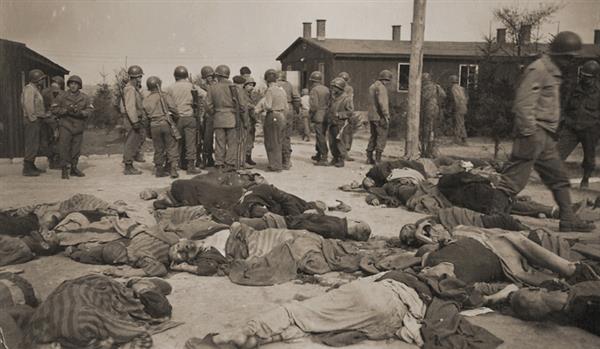
At the liberation of concentration camp Ohrdruf, the Americans saw the horrors of the concentration camps for the first time with their own eyes USHMM Source: USHMM
During the last stage of the war, the German population was being ravaged by aerial bombardments on their cities. It happened frequently that German civilians lynched crew members of downed Allied bombers after they had parachuted to the ground. This was a war crime as airmen should be treated as prisoners of war, pursuant to the Geneva Convention. Ferencz was sent in a jeep to conduct investigation in the field into that kind of occurrences on German soil that meanwhile had fallen into American hands. He usually operated on his own, armed with only a pistol. As soon as he arrived on a crime scene, he had the local mayor or chief of police assemble all civilians in the vicinity. Subsequently he ordered witnesses to testify, sometimes under threat of summary execution. Resistance was never an issue. He was also charged with tracking down the mortal remains for identification. This was a difficult task for him.

Corpses of prisoners are being cleard after the liberation of camp Ebensee Source: USHMM / Benjamin Ferencz
Based on Ferencz's work the Americans were able to prosecute over 600 Germans in former concentration camp Dachau after the war for murdering Allied airmen; 140 of them were sentenced to death. In addition to this investigation, Ferencz also busied himself collecting evidence of crimes committed in German concentration camps. On a map he kept track of the locations where the Americans had discovered such camps. After American troops had stumbled onto an Aussenlager -satellite camp- of concentration camp Buchenwald full of horror scenes in Ohrdruf near Erfurt, he travelled there himself to witness the stacks of emaciated corpses and other evidence of atrocities. He was shocked at what he saw here and in other concentration camps. Even today, he rather not speaks or thinks of the details. ' My mind would not accept what my eyes saw.' he states. 'I had peered into Hell.'
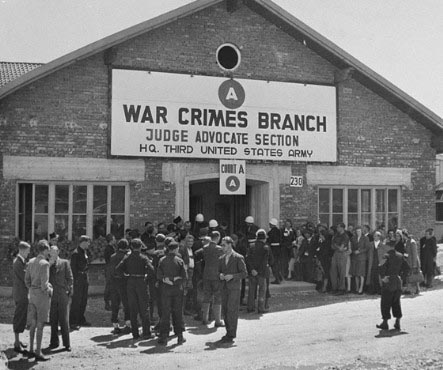
The building of the War Crimes Department of the Judge Advocate Section of the Third Army in Dachau Source: NARA
Just shoot them!
Another camp that was visited by Ferencz was located in Ebensee in Austria. In this Nebenlager -subcamp- of concentration camp Mauthausen, prisoners were forced to dig tunnels for the storage of weapons under dismal conditions, resulting in a high mortality rate. On May 6, 1945, the camp was liberated by the Americans. Ferencz witnessed revengeful prisoners taking on a camp guard who had attempted to escape. After he had been thoroughly beaten up first, he was burned alive in the crematory of the camp. Ferencz watched how the man was shoved in and out of the oven time and again. 'There seemed to be no limit to human brutality in wartime.' he concluded after the war. A Russian soldier whom he had met at the time also had other ideas than he did how to handle people suspected of war crimes. When he told the man he was investigating crimes of the SS, the man was amazed. ' Don’t you know what they did?' he asked. 'Just shoot them!'
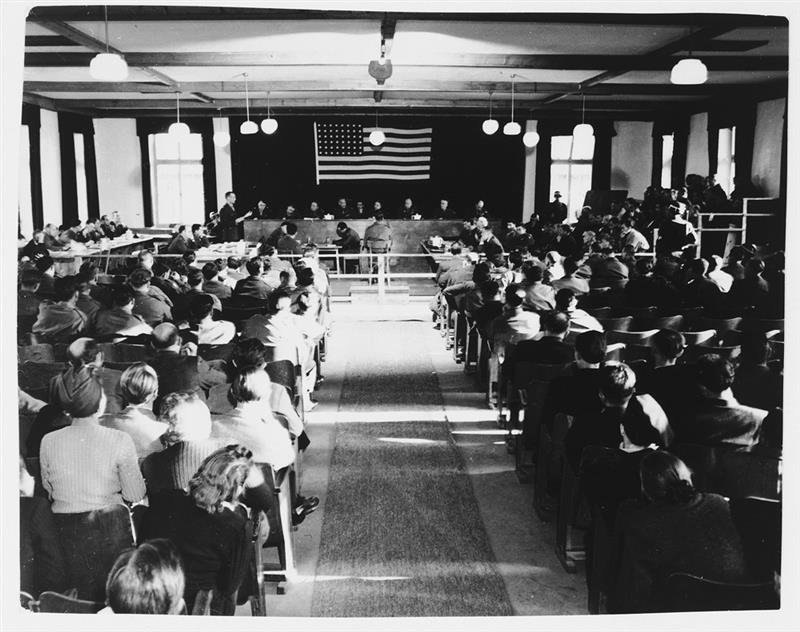
The court room in Dachau where the American tribunals against for instance the camp gaurds were held Source: USHMM
The evidence collected by Ferencz could later be used in trials against camp guards. Ferencz was relieved his work in Germany was over in December 1945. The three years in the American army were 'the most miserable experience of my life.' he stated. 'Never again did I want to witness such horrors.' It was his firm conviction that averting war was the only way to prevent such crimes in the future.
Definitielijst
- Aussenlager
- “Outside camp”. A concentration camp at a certain distance from a larger camp, the so-called Stammlager, but part of the same organisation.
- concentration camp
- Closed camp where people are being held captive that are considered to be anti- social, enemies of the state, criminal or unwanted individuals. These groups mostly do not get a fair trial or are condemned to doing time in a camp.
- Mauthausen
- Place in Austria where the Nazi’s established a concentration camp from 1938 to 1945.
- war crimes
- Crimes committed in wartime. Often concerning crimes committed by soldiers against civilians.
In post-war Germany
'Honeymoon' to Germany
Ferencz returned to the US in the rank of sergeant. He started looking for a job which wasn't easy regarding the large number of men returning from the front. Probably after recommendation by his former mentor Sheldon Glueck, he was invited to the Pentagon after a few weeks, the American Department of Defense. There he learned the army was urgently looking for lawyers experienced in trying war criminals. Ferencz, who had never risen beyond sergeant was asked to return to Germany in the rank of colonel to assist in persecuting war criminals.
He refused to enter military service again but he agreed to make his contribution to the American jurisdiction with the privileges of a colonel. A return to Germany seemed to be a fitting honeymoon. Prior to his crossing in March 1946, he married his stepmother's niece Gertrude, whom he had befriended since secondary school. She wasn't allowed to accompany her husband to Germany right away but she would soon follow him aboard the ship carrying the spouses of military personnel.
On arrival in Germany, Ferencz was sent to Berlin to establish a branch of the 'Office of the Chief of Counsel for War Crimes (OCCWC). At that moment, 22 Nazis including Hermann Göring and Albert Speer stood trial before the International Military Tribunal (IMT) in Nuremberg, but the American investigative office was already busy gathering evidence against other suspects. The ruling of the Tribunal followed on October 1, 1946. Subsequently, from December 9, 1946 to April 13, 1949, follow-up trials were held by 12 American Military Tribunals (the Nuremberg Military Tribunal or NMT), likewise in Nuremberg against 185 defendants including physicians, judges, leaders of industry and military commanders. In charge of the team of prosecutors was Brigadier General Telford Taylor, who had previously assisted chief prosecutor Robert Jackson during the IMT.
An important find
In Berlin, Ferencz was soon put in charge of the OCCWC office. He hired his wife, who had studied German, as an investigator. Ferencz as his colleagues combed the archives of Nazi institutions in Berlin for evidence. It was a massive job. In the Berlin Document Center (BDC) alone, set up by the Americans as a storage for Nazi archives, between 8 and 9 million documents were stored, according to Ferencz. There was a shortage of man power as well as time.
According to Ferencz, it was in the spring of 1947 when an associate made an important discovery in the archives of the Nazi Außenministerium. It was a complete collection of so-called Ereignismeldungen -progress reports- of the Einsatzgruppen. In these secret reports the number of executions carried out by these death squads during the German invasion of the Soviet-Union had been meticulously recorded. Victims were mainly Jews but Gypsies and Soviet officials fell victim to German firing squads as well. When Ferencz tabulated the numbers, he stopped when he passed 1 million. He knew he had important evidence on his hands and took the first flight to Nuremberg to report to General Taylor.
Definitielijst
- invasion
- Armed incursion.
- Jews
- Middle Eastern people with own religion that lived in Palestine. They distinguished themselves by their strong monotheism and the strict observance of the Law and tradition. During World War 2 the Jewish people were ruthlessly persecuted and annihilated by the German Nazis. . An estimated 6,000,000 Jews were exterminated.
- Nazi
- Abbreviation of a national socialist.
- War Crimes
- Crimes committed in wartime. Often concerning crimes committed by soldiers against civilians.
Einsatzgruppen trial
Largest murder trial in history
First off, it had to be decided who of the 3,000 members of the Einsatzgruppen were to stand trial. In the dock of the court room in Nuremberg, there was only space for 24 defendants. Ferencz and his colleagues decided to focus on the highest ranking officers and the best educated members. In the end, 24 persons were indicted including six generals. The highest ranking was Otto Ohlendorf who had commanded Einsatzgruppe D as SS-Gruppenführer. He was designated Defendant Nr 1. The trial, called the '' largest murder trial in history' by the media, was launched on September 15, 1947 and would last until April 10, 1948. Meanwhile, two defendants would drop out: one was released for medical reasons, the other committed suicide in his cell.
On September 29, 1947 in the court room in Nuremberg, all eyes were focused on a little man behind the rostrum: Benjamin Ferencz delivered his opening speech. That day it was exactly six years ago that in a ravine Babi Yar near Kiev in the Ukraine, a subgroup of Einsatzgruppe C started on a mass execution of Jews that would claim 33,771 victims in 2 days. SS-Standartenführer Paul Blobel, the commander responsible for this mass murder, was one of the men in the dock. Ferencz wasn't nervous to charge him and the other defendants with mass murder. He was so sure of his case, it took him only two days to present the evidence. He only submitted the official reports of the Einsatzgruppen in evidence. He abstained almost entirely from witness' testimonies as they were subjective. In contrast, the defense needed 136 days for its rebuttal.
Genocide
The defendants were indicted for crimes against humanity, war crimes and membership of a criminal organization. For the first time during a trial, Ferencz introduced the term genocide, a word invented by Polish lawyer Raphael Lemkin. It is a combination of the Greek word geros (population) and the Latin word caedere (murder). Ferencz emphasized that revenge of this genocide wasn't the aim of the tribunal. It was far more a plea for 'the right of all human beings to live in peace and dignity, regardless of their race, or creed, or religion, or color'.

Chief prosecutor Ferencz delivering his opening speech during the Einsatzgruppen trial Source: USHMM / Benjamin Ferencz
In his memoirs Ferencz wrote he hoped that the trial 'might somehow help to deter the repetition of such horrors in the future. I was determined to do whatever I could to help lay a foundation for a more humane world.' In the final sentence of his opening speech in Nuremberg he called the defendants: ' the cruel executioners whose terror wrote the blackest page in human history. […]If these men be immune, then law has lost its meaning and man must live in fear.'
The defendants attempted to play down their guilt with various arguments. Ohlendorf for instance called the executions by the Einsatzgruppen acts of self-defense. He argued that Bolshevism, with the Jews as the driving force, wanted to destroy Germany. Ferencz countered however that the Jews were being murdered only because of their ancestry, not because they posed a real danger. In February the hearings ended and it was the judges' turn to pronounce a verdict.
Never again
On April 10. the remaining 22 defendants, except 2 were found guilty on all 3 counts of the indictment. Fifteen of them were sentenced to death but in the end only four, including Blobel and Ohlendorf, ended up on the gallows in Landsberg prison. On January 31, 1951, the American authorities had revised the sentences and had reached a milder verdict in the other cases. During the following years, all convicts would be released ahead of time. This amnesty was viewed in the light of the Cold War, when the Americans considered Western Germany their ally in the fight against Communism and the release ahead of time of the Nazi war criminals was meant to improve the relations between the Federal Republic and the West.
Ferencz could look back on the tribunal with satisfaction but wasn't in a cheering mood. He skipped the habitual party to celebrate the ending of a successful trial. The fact that 15 defendants had been sentenced to death was a heavy burden on his conscience. He may well have considered the death penalty justified but revenge had never been his aim. He hadn't demanded the death penalty himself because he was afraid to 'trivialize the magnitude of the crimes by suggesting that it could be settled, and perhaps then forgotten, by executing a handful of genocidal killers. We owed it to the millions of victims to try and give their deaths some greater significance. Perhaps by revealing the depths of their suffering, and demonstrating that law would not condone such atrocities, the cry "Never Again" might become a reality'.
Definitielijst
- Babi Yar
- A ravine northwest of the Ukranian capital Kiev. On 29 and 30 September 1941, 33,771 Jews were killed and dumped into the ravine by Sonderkommando 4a under command of Paul Blobel.
- Communism
- Political ideology originating from the work of Karl Marx “Das Kapital” written in 1848 as a reaction to the so-called class struggle between the proletariat (labourers) and the bourgeoisie. According to Marx the proletariat would take over power from the well-to-do classes though a revolution. The communist movement aspires an ideal situation where the means of production and the means of consumption are common property of all citizens. This should end poverty and inequality (communis = common).
- crimes against humanity
- Term that was introduced during the Nuremburg Trials. Crimes against humanity are inhuman treatment against civilian population and persecution on the basis of race or political or religious beliefs.
- Einsatzgruppen
- "Taskforces of Deployment Squads". Special units composed of various SS and police services under supervision of the Reichssicherheitshauptamt (RSHA). Einsatzgruppen were deployed during the invasion of Poland in 1939 and during operation Barbarossa in 1941. In 1939 these units were ordered to eliminate the Polish intelligentsia. In the Soviet Union they were deployed to execute various political and racial enemies of the Third Reich, like Jews, gypsies and communists. The "Holocaust by bullets" in the Soviet Union was the horrendous first act of the eventual "final solution".
- Jews
- Middle Eastern people with own religion that lived in Palestine. They distinguished themselves by their strong monotheism and the strict observance of the Law and tradition. During World War 2 the Jewish people were ruthlessly persecuted and annihilated by the German Nazis. . An estimated 6,000,000 Jews were exterminated.
- Nazi
- Abbreviation of a national socialist.
- war crimes
- Crimes committed in wartime. Often concerning crimes committed by soldiers against civilians.
After Nuremberg
The shortest general since Napoleon
After the Einsatzgruppen tribunal, Ferencz assisted in the other follow-up trials. He was given a promotion and from then on he operated as a civilian on the level of a brigadier general. In his memoirs he remarked mockingly that he with his small posture must have been the shortest general since Napoleon. In his new function he was responsible for the finalization of the work of the OCCWC. He handed evidence against war criminals who couldn't be prosecuted due to a lack of time or financial or political reasons over to the German authorities.
The ending of the American trials in Nuremberg in April 1949 didn't mean the end of Ferencz's presence in Germany. What he initially had considered a honeymoon would grow into a stay of 10 years. In the American zone of occupation and later on in the entire Federal Republic he busied himself with the organization of the restitution of Jewish property stolen by the Nazis and coordination of the compensation claims which were submitted to the West-German authorities by the victims of the persecution. In that capacity he was instrumental in the establishment of the Reparation Agreement between Israel and Germany. Under this agreement, the Federal Republic was compelled to compensate Israel for the forced labor and the persecution of Jews during the war and also for the Jewish property that was stolen by the Nazis. This agreement was signed by Chancellor Konrad Adenauer in Luxemburg on September 10, 1952.
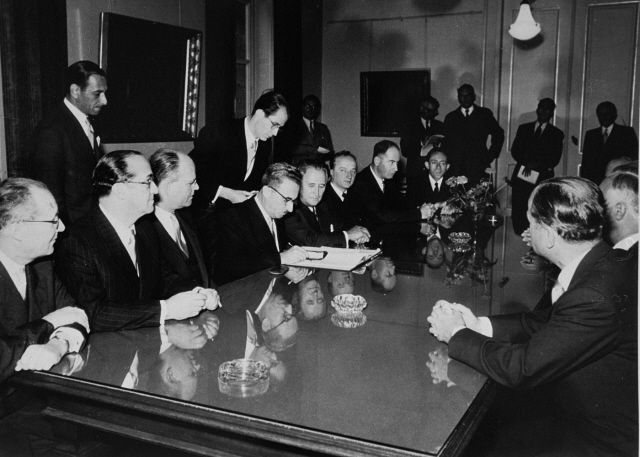
Signing of the Reparations Agreement between Israël and West Germany, September 10, 1952. Ferencz is sixth from the left Source: USHMM / Benjamin Ferencz
In 1956, the honeymoon trip of Ferencz and his wife finally came to an end. With their four children, all born in Germany, they returned to the US.
Advocate of world peace
Back in the US, Ferencz first worked as a lawyer and Telford Taylo's partner, his former boss in Nurenberg, for 16 years. In 1970, with the US embroiled in a hopeless struggle in Vietnam, he quit his job as a lawyer in order to focus entirely on his drive for world peace. He wrote several books on international penal law and was a great advocate of the establishment of the Internationaal Strafhof -International Penal Court- in The Hague. It hurts him that his own country still hasn't ratified the Rome Agreement because it refuses to extradite its own citizens to this court.
Although he loves his country, Ferencz does not hesitate up until this day to criticize his government when it violates the rules of war or human rights. He turned against the war in Iraq because it had been launched without permission by the Security Council of the United Nations. He advocated that not only Saddam Hussain but George Bush as well should stand trial for war crimes. More recently, Ferencz spoke out against the execution of terrorist leader Osama Bin Laden. He considered this settlement illegal and that it undermined democracy. In July 2013, he announced on Twitter: 'It's a pity our govt seeks to intimidate nations that might offer asylum to a citizen whose offense is a determination to tell the truth'. He meant the evasive former employee of the National Security Agency and whistle blower Edward Snowden who had leaked information about American spying methods on the internet.
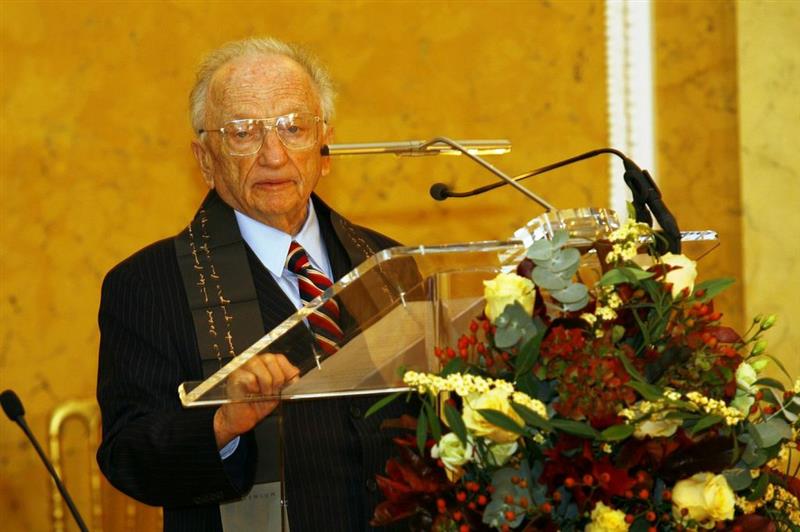
At Erasmus University in Rotterdam, Ferencz delivers his speech of thanks after having been presented the Erasmusprijs in 2009 Source: Benjamin Ferencz
For his commitment to world peace and international law, Ferencz received the Erasmus price in the Netherlands in 2009. A year later, he was decorated with the Großes Kreuz des Verdienstorden der Bundesrepubliks Deutschland -Grand Cross in the Order of Merit of the Federal German Republic.
More information?
A more extensive description of this story -in Dutch- can be found in the book 'Meer dan Alleen Auschwitz' by the same author.
Definitielijst
- democracy
- From the Greek: demos (the people) kratein (rules). Democracy is a form of government elected by the majority of the people in which the people can check on the leaders and have the government resign in case a majority of the people no longer agrees with the government.
- Jews
- Middle Eastern people with own religion that lived in Palestine. They distinguished themselves by their strong monotheism and the strict observance of the Law and tradition. During World War 2 the Jewish people were ruthlessly persecuted and annihilated by the German Nazis. . An estimated 6,000,000 Jews were exterminated.
- war crimes
- Crimes committed in wartime. Often concerning crimes committed by soldiers against civilians.
Information
- Article by:
- Kevin Prenger
- Translated by:
- Arnold Palthe
- Published on:
- 19-01-2025
- Feedback?
- Send it!
News
Benjamin B. Ferencz, Last Surviving Nuremberg Prosecutor, Dies at 103
Benjamin B. Ferencz, the last surviving prosecutor of the Nuremberg trials, who convicted Nazi war criminals of organizing the murder of a million people and German industrialists of using slave labor from concentration camps to build Hitler’s war machine, died on Friday at an assisted living facility in Boynton Beach, Fla. He was 103.
